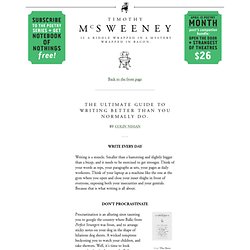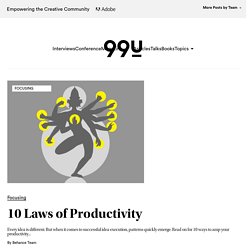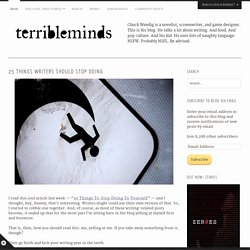

15 Things a Writer Should Never Do. Based on interviews with authors over the years, conferences, editing dozens of issues of Writer’s Digest, and my own occasional literary forays and flails, here are some points of consensus and observations: 15 of them, things anyone who lives by the pen (or seeks to) might consider.

It is, like most things in the writing world, a list in progress—and if you’ve got your own Dos or Don’ts to add, I’d love to hear them in the Comments. 1. 5 Ways to Get Rid of Your Damn Empty Modifiers. I discussed the need to get rid of empty emphatics when I gave you 8 words to seek and destroy in your writing, but just saying that you should get rid of a thing doesn't say much about the right way to do so.

Today I'm going to show you a few of my favorite ways to get rid of your empty modifiers. What exactly is an empty modifier? It's any word whose only role is to intensify the word it's modifying. The prime candidates here are "very" and "really," but "extremely," "intensely," "totally," "absolutely," "quite," and many other emphatic modifiers make the list. Further, many emphatics that shift meaning slightly or add some flavor (e.g., "just" or "damn") should be approached with skepticism, and it's easy to find flimsy "-ly" words that show us why the road to hell is paved with adverbs. Write More, Sell More: 5 Crazy Productivity Tricks For Writers. Want to make more money from your writing?

Here’s the answer: write more. Over the years, I’ve discovered that the trick is to write more than you think you can write, but back off just before you exhaust yourself. If you write more than you think you can, you’ll be inspired – you’ll get more and better ideas. But if you wear yourself out, you’ll burn out. In the 1990s I took on more book contracts than I could handle, and wrote 15 hours a day for weeks. Pixar’s 22 Rules of Storytelling. These rules were originally tweeted by Emma Coats, Pixar’s Story Artist.

Short Stories: 10 Tips for Creative Writers. Neil Gaiman’s 8 Good Writing Practices. The Ultimate Guide to Writing Better Than You Normally Do. Writing is a muscle.

Smaller than a hamstring and slightly bigger than a bicep, and it needs to be exercised to get stronger. Think of your words as reps, your paragraphs as sets, your pages as daily workouts. Think of your laptop as a machine like the one at the gym where you open and close your inner thighs in front of everyone, exposing both your insecurities and your genitals. Because that is what writing is all about. Procrastination is an alluring siren taunting you to google the country where Balki from Perfect Strangers was from, and to arrange sticky notes on your dog in the shape of hilarious dog shorts. The blank white page. Mark Twain once said, “Show, don’t tell.” Finding a really good muse these days isn’t easy, so plan on going through quite a few before landing on a winner. 9 (Arbitrary) Ways to Get Your Writing Rejected. When novelist Helen Simonson ( Major Pettigrew's Last Stand) was asked to help winnow entries for short story contests and literary journals, it was her turn to switch from seeking approval to giving it out.
Sparingly. As she puts it: Having spent many years putting hours of effort and creativity into my own work -- sending off brown envelopes filled with still-warm pages, to various editors and judges -- it is rather horrifying to discover that it takes me about a minute to know that yet another manuscript is about to be "binned" as they say. 10 Laws of Productivity. You might think that creatives as diverse as Internet entrepreneur Jack Dorsey, industrial design firm Studio 7.5, and bestselling Japanese novelist Haruki Murakami would have little in common.

In fact, the tenets that guide how they – and exceptionally productive creatives across the board – make ideas happen are incredibly similar. Here are 10 laws of productivity we’ve consistently observed among serial idea executors: 1. Break the seal of hesitation. A bias toward action is the most common trait we’ve found across the hundreds of creative professionals and entrepreneurs we’ve interviewed. 2. When our ideas are still in our head, we tend to think big, blue sky concepts. 3. Words I Never Want to See in Your Novel. 25 Things Writers Should Stop Doing. I read this cool article last week — “30 Things To Stop Doing To Yourself” — and I thought, hey, heeeey, that’s interesting.

Writers might could use their own version of that. So, I started to cobble one together. And, of course, as most of these writing-related posts become, it ended up that for the most part I’m sitting here in the blog yelling at myself first and foremost. That is, then, how you should read this: me, yelling at me. If you take away something from it, though? Then go forth and kick your writing year in the teeth. Onto the list. 1. 7 Things Dungeons & Dragons Taught Me About Storytelling.
Once upon a time (in high school), a classmate bashed on what was then my preferred hobby: Dungeons and Dragons.

His main argument was that, while not harmful, playing D&D was ultimately a waste of time. He challenged me to tell him how I benefited in any practical way, and the best response I could make was that enjoyment was an end of its own. Well, it's a belated addendum, but I want to expand on that now. My years of experience as a Dungeon Master have taught me many valuable lessons, and many of those lessons are specifically applicable to my writing. Here are the seven most significant storytelling lessons I learned from playing Dungeons and Dragons. A Few Quick Words About D&D For those of you unfamiliar with D&D, the concept is simple: It's a tabletop role-playing game where people roll dice and adopt the persona/abilities of a fantasy character. 5 Writing Tips: Dinaw Mengestu.